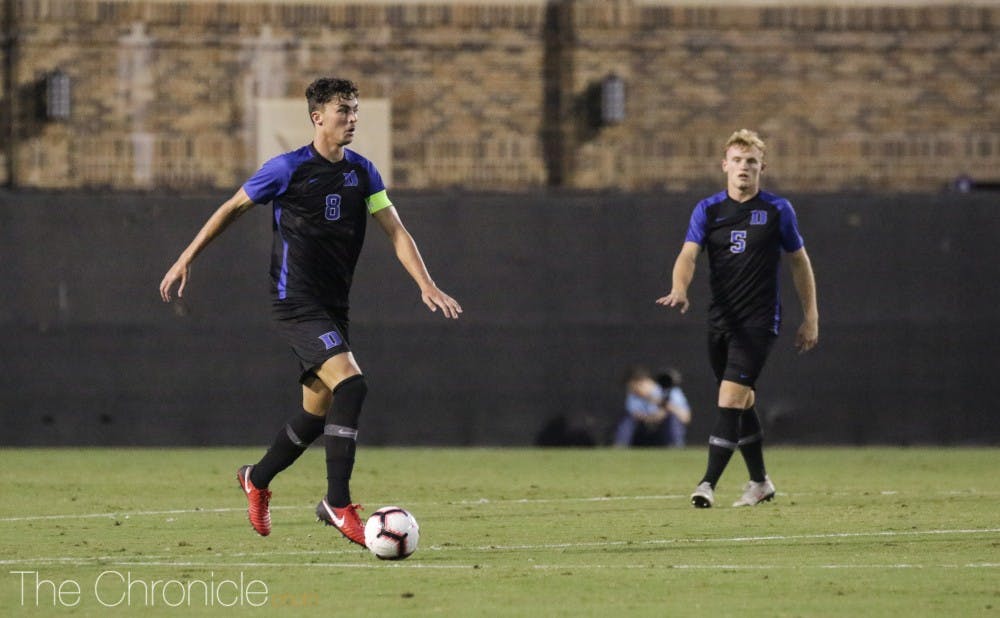With one of the top programs in the nation at one of the top academic institutes to boot, it’s no surprise that players from around the world are interested in joining the ranks of Duke men's soccer.
With athletes from soccer-dominant countries like Germany and Argentina, the Blue Devils' international group of players has settled in Durham and plays alongside American teammates in a country where the sport is only just beginning to catch on.
Giving college a chance
The ratio of foreign to domestic players within Duke's roster has risen over the years. Foreign players currently make up 39 percent of the team, a stark contrast to the predominantly American lineups the Blue Devils have put together in the past. In 2015, just 23 percent of the players were foreigners, and in the 2012 season, these players made up just 12 percent of the roster.
Duke head coach John Kerr attributed the increase of international recruits to two things.
“Some of these players that we normally get domestically are going pro early either here in the United States or abroad, and the other element is that the international players have decided that this is a more viable option for them and they’re very talented," Kerr said. "If they don’t end up on Duke’s roster, they’ll end up on UVA’s roster or UNC’s roster.”
Some of these international recruits have come to America despite professional contracts they were offered in their home countries. At the age of 16, junior Ciaran McKenna was offered a professional contract with Celtic, a soccer club based in his hometown of Glasgow, Scotland. Despite the opportunity of playing under the green and white banner, a dream of his from age 9, he rejected the offer to pursue a more academically-focused path.
“I’ve grown up in a culture of football," McKenna said. "I’ve seen so many people leave school and then to be injured or to lose form and then two or three years later, they’re not playing football and they don’t have the education to go and get a good job. I know how dangerous that was, so that is what inspired the decision to come here and it was more that I felt I would mature as a person socially, academically and athletically.”
Reeling them in
The recruitment process for foreign players is much different than that of their American counterparts. While recruiting usually begins around a domestic player’s sophomore year in high school, the process starts much later for international recruits. International players are not sought out and are instead expected to reach out to Duke during their senior year if they’re interested in playing for the team.
This initial step is accompanied by a highlight tape and transcript sent to Kerr. After this introduction, the Blue Devil head coach requests a tape showing the player’s performance within a 90-minute game. To conclude the recruitment process, Kerr will then travel to the player’s home country to see him play and meet him in person.
“Coach Kerr paid me a visit from Glasgow and was a huge supporter of the club I played for, so right away we had the familiar connection," McKenna said. "Straight away they wanted me to come visit and I saw the facilities and how prestigious the university was and it was hard to change my mind after that. Straight after the visit, I knew that I wanted to come here and I didn’t consider any other schools after that.”
An international recruit can be posed with difficulties off the field as well. Some of the players aren’t familiar with Greek life, or with the general social life that comes along with being an athlete. While home is much further away for these players, struggling with distance and long periods of time without family is natural.
However, foreign players also come to America with an upper hand.
“Typically, these guys are older, so their school system takes them until they're 18 or 19, where ours takes them to 17 or 18," Kerr said. "So typically the international guys are one year more mature, more physically developed than our guys, so that’s a big advantage for them.”
Although drawing from around the world poses its own challenges, Duke's recent resume of a brief No. 2 ranking earlier this season and an NCAA tournament berth a year ago has shown that the Blue Devils stand to benefit from looking overseas.
Get The Chronicle straight to your inbox
Signup for our weekly newsletter. Cancel at any time.

